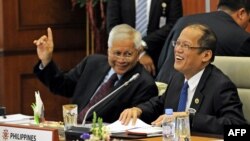MANILA —
Senior officials from the Philippines say they came away from this week’s summit of the Association of Southeast Asian Nations (ASEAN) in Brunei with a favorable outlook on the group’s steps to resolve territorial disputes in the South China Sea.
Philippine Foreign Affairs Secretary Albert del Rosario said the South China Sea was a “major topic” at the 10-country gathering.
Del Rosario recounted to reporters in Manila Friday that coming up with a binding Code of Conduct on handling the competing claims with China was a recurring theme.
“As far as the presence of the 10-member states, I got the impression, a very distinct, good, positive, impression that we were solid, there was solidarity in terms of readiness to convince China that we should move on with the COC,” Rosario said.
This was a contrast to last July, when for the first time, the group did not release a joint statement because of disagreement over how to deal with disputes in the South China Sea. At the time, the Philippines had just negotiated a tense confrontation with China over a shoal that the Philippines says is part of its territory.
China and Taiwan claim practically the entire sea. The Philippines, Vietnam, Malaysia and Brunei have partial claims to it. The waters have some of the most heavily traveled shipping lanes, are important to fishermen and have potentially huge hydrocarbon reserves.
In 2002, ASEAN and China signed a non-binding agreement to manage the disputes through peaceful means. But they have been unable to reach agreement on a legally binding Code of Conduct.
In January, Philippine authorities took the territorial dispute to an international tribunal under the U.N. convention on the Law of the Sea. On Friday, China’s foreign ministry repeated that it would never give up its claims and looks forward to resolving the disputes through negotiations.
The summit this week was the first major ASEAN gathering for this year’s host nation Brunei.
Immediately following the summit Thursday ASEAN chair Brunei Sultan Haji Hassanal Bolkiah noted to reporters the improvement over the last time the group talked about the issue.
"We have had a good discussion among leaders and there has been some progress since last year, we have agreed on what I see as a two-step approach," he noted. "Firstly, the overlapping claims are for the claimant states to deal with. Secondly, both ASEAN and China wish to promote a calm and peaceful atmosphere and to urgently work on the code of conduct."
China has consistently expressed a preference for dealing with the territorial squabbles one-on-one. The Philippines and some other ASEAN countries have sought to make it an international issue.
Later this year, Beijing is hosting a senior foreign ministers’ meeting with ASEAN members. Del Rosario said member-state Thailand this week proposed a pre-meeting gathering among ASEAN foreign ministers to reinforce their solidarity on the issue before they talk to China.
Philippine Foreign Affairs Secretary Albert del Rosario said the South China Sea was a “major topic” at the 10-country gathering.
Del Rosario recounted to reporters in Manila Friday that coming up with a binding Code of Conduct on handling the competing claims with China was a recurring theme.
“As far as the presence of the 10-member states, I got the impression, a very distinct, good, positive, impression that we were solid, there was solidarity in terms of readiness to convince China that we should move on with the COC,” Rosario said.
This was a contrast to last July, when for the first time, the group did not release a joint statement because of disagreement over how to deal with disputes in the South China Sea. At the time, the Philippines had just negotiated a tense confrontation with China over a shoal that the Philippines says is part of its territory.
China and Taiwan claim practically the entire sea. The Philippines, Vietnam, Malaysia and Brunei have partial claims to it. The waters have some of the most heavily traveled shipping lanes, are important to fishermen and have potentially huge hydrocarbon reserves.
In 2002, ASEAN and China signed a non-binding agreement to manage the disputes through peaceful means. But they have been unable to reach agreement on a legally binding Code of Conduct.
In January, Philippine authorities took the territorial dispute to an international tribunal under the U.N. convention on the Law of the Sea. On Friday, China’s foreign ministry repeated that it would never give up its claims and looks forward to resolving the disputes through negotiations.
The summit this week was the first major ASEAN gathering for this year’s host nation Brunei.
Immediately following the summit Thursday ASEAN chair Brunei Sultan Haji Hassanal Bolkiah noted to reporters the improvement over the last time the group talked about the issue.
"We have had a good discussion among leaders and there has been some progress since last year, we have agreed on what I see as a two-step approach," he noted. "Firstly, the overlapping claims are for the claimant states to deal with. Secondly, both ASEAN and China wish to promote a calm and peaceful atmosphere and to urgently work on the code of conduct."
China has consistently expressed a preference for dealing with the territorial squabbles one-on-one. The Philippines and some other ASEAN countries have sought to make it an international issue.
Later this year, Beijing is hosting a senior foreign ministers’ meeting with ASEAN members. Del Rosario said member-state Thailand this week proposed a pre-meeting gathering among ASEAN foreign ministers to reinforce their solidarity on the issue before they talk to China.




